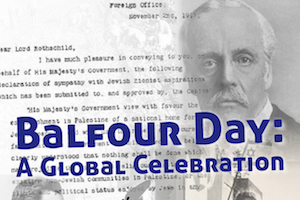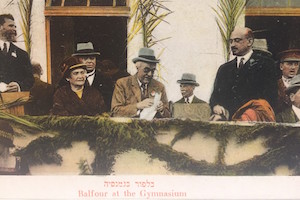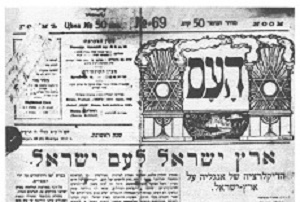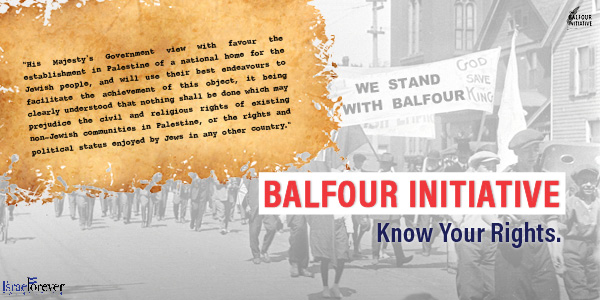Legal Rights and Title of Sovereignty of the Jewish People to the Land of Israel and Palestine under International Law
By Howard Grief
A brief, yet clear and precise explanation of the legal rights and title of sovereignty of the Jewish people to the Land of Israel and Palestine under international law.
As part of the settlement in which the Arabs received most of the lands formerly under Turkish sovereignty in the Middle East, the whole of Palestine, on both sides of the Jordan, was reserved exclusively for the Jewish people as their national home and future independent state.
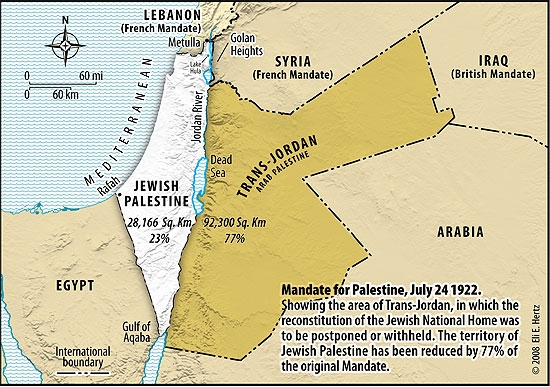
Under the terms of the settlement that were made by the Principal Allied Powers consisting of Britain, France, Italy and Japan, there would be no annexation of the conquered Turkish territories by any of the Powers, as had been planned in the secret Sykes-Picot Agreement of May 9 and 16, 1916. These territories, including the peoples for whom they were designated, would be placed under a Mandates System and administered by an advanced nation until they were ready to stand by themselves.
The Covenant was the idea of US President Woodrow Wilson, while Article 22 was largely the work of Jan Christiaan Smuts who formulated the details in a memorandum officially endorsed by the Council of Ten on January 30, 1919, in which Palestine as envisaged in the Balfour Declaration was named as one of the mandated states to be created.
This meant that Palestine from the start was legally a Jewish state in theory that was to be guided towards independence by a Mandatory or Trustee, also acting as Tutor, and who would take the necessary political, administrative and economic measures to establish the Jewish National Home. The chief means for accomplishing this was by encouraging large-scale Jewish immigration to Palestine, which would eventually result in making Palestine an independent Jewish state, not only legally but also in the demographic and cultural senses.
The moment of birth of Jewish legal rights and title of sovereignty thus took place at the same time Palestine was created a mandated state, since it was created for no other reason than to reconstitute the ancient Jewish state of Judea in fulfillment of the Balfour Declaration and the general provisions of Article 22 of the League Covenant.
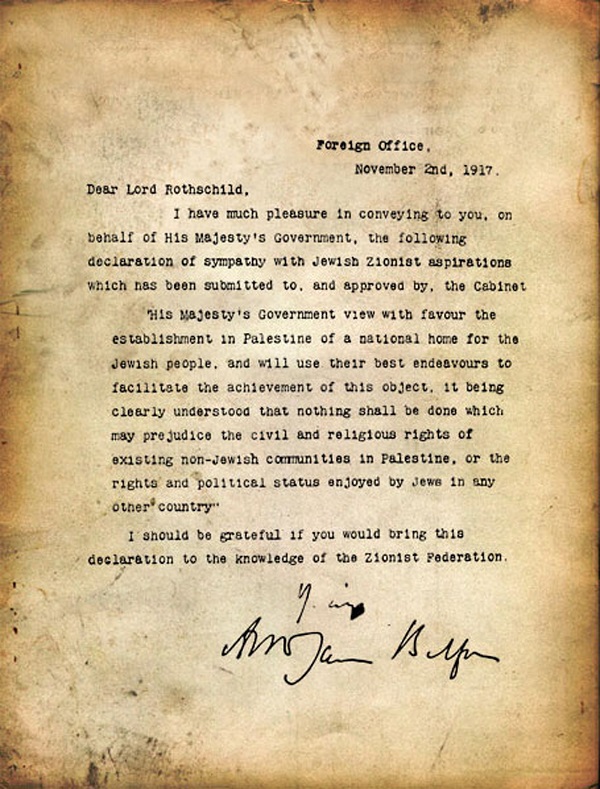
The details for the planned independent Jewish state were set forth in three basic documents, which may be termed the founding documents of mandated Palestine and the modern Jewish state of Israel that arose from it. These were the San Remo Resolution of April 25, 1920, where the Balfour Declaration was adopted into international law, the Franco-British Boundary Convention of December 23, 1920, and the Mandate for Palestine conferred on Britain by the Principal Allied Powers and confirmed by the League of Nations on July 24, 1922. These founding documents were supplemented by the Anglo-American Convention of December 3, 1924 respecting the Mandate for Palestine as the basis for the future administration of Palestine which would henceforth be recognized as the Jewish National Home.
It is of supreme importance to remember always that these documents were the source or well-spring of Jewish legal rights and title of sovereignty over Palestine and the Land of Israel under international law because of the near-universal but completely false belief that it was the United Nations General Assembly Partition Resolution of November 29, 1947 that brought the State of Israel into existence.
The San Remo Resolution converted the Balfour Declaration of November 2, 1917 from a mere statement of British policy expressing sympathy with the goal of the Zionist movement to create a Jewish state into a binding act of international law that required specific fulfillment by Britain of this object in active cooperation with the Jewish people.
Under the Balfour Declaration as originally issued by the British government, the latter only promised to use their best endeavors to facilitate the establishment in Palestine of a national home for the Jewish people. But under the San Remo Resolution of April 24-25, 1920, the Principal Allied Powers as a cohesive group charged the British government with the responsibility or legal obligation of putting into effect the Balfour Declaration. A legal onus was thus placed on Britain to ensure that the Jewish National Home would be duly established.
There was no doubt that when Palestine was named in the context of Article 22, it was linked exclusively to the Jewish National Home, as set down in the Balfour Declaration, a fact everyone was aware of at the time, including the representatives of the Arab national movement. Palestine and the Jewish National Home were synonymous terms, as is evidenced by the use of the same phrase in the second half of the Balfour Declaration which refers to the existing non-Jewish communities "in Palestine", clearly indicating the whole country.

The Mandate itself which created a right of return for the Jewish people to Palestine and the right to establish settlements on the land throughout the country in order to create the envisaged Jewish state. It specifically stated that the general provisions of Article 22 be applied to the Jewish people exclusively, who would set up their home and state in Palestine.
This was as evidenced by the agreement between Emir Feisal and Dr. Chaim Weizmann dated January 3, 1919 as well as an important letter sent by the Emir to future US Supreme Court Justice Felix Frankfurter dated March 3, 1919. In that letter, Feisal characterized as “moderate and proper” the Zionist proposals presented by Nahum Sokolow and Weizmann to the Council of Ten at the Paris Peace Conference on February 27, 1919, which called for the development of Palestine into a Jewish commonwealth with extensive boundaries and specifically included Palestine within its legal framework.
The San Remo Resolution on Palestine became Article 95 of the Treaty of Sevres and retained its validity as an independent act of international law when it was inserted into the Preamble of the Mandate for Palestine and confirmed by 52 states. The San Remo Resolution is the base document upon which the Mandate was constructed and to which it had to conform. It is therefore the pre-eminent foundation document of the State of Israel and the crowning achievement of pre-state Zionism. It has been accurately described as the Magna Carta of the Jewish people. It is the best proof that the whole country of Palestine and the Land of Israel belong exclusively to the Jewish people under international law.
The Mandate for Palestine implemented both the Balfour Declaration and Article 22 of the San Remo Resolution. All four of these acts were building blocks in the legal structure that was created for the purpose of bringing about the establishment of an independent Jewish state. The Balfour Declaration in essence stated the principle or object of a Jewish state. The San Remo Resolution gave it the stamp of international law. The Mandate furnished all the details and means for the realization of the Jewish state.
Indeed, the civil and religious rights of all existing religious communities in Palestine, whether Moslem or Christian, were safeguarded, as well as the civil and religious rights of all the inhabitants of Palestine, irrespective of race and religion. The rights of Arabs, whether as individuals or as members of religious communities, but not as a nation, were therefore legally assured. In addition, no prejudice was to be caused to their financial and economic position by the expected growth of the Jewish population.
The decisive moment of change came on May 14, 1948 when the representatives of the Jewish people in Palestine and of the Zionist Organization proclaimed the independence of a Jewish state whose military forces held only a small portion of the territory originally allocated for the Jewish National Home. The rest of the country was in the illegal possession of neighboring Arab states who had no sovereign rights over the areas they illegally occupied, that were historically a part of Palestine and the Land of Israel and were not meant for Arab independence or the creation of another Arab state.
It is for this reason that Israel, which inherited the sovereign rights of the Jewish people over Palestine, has the legal right to keep all the lands it liberated in the Six Day War that were either included in the Jewish National Home during the time of the Mandate or formed integral parts of the Land of Israel that were illegally detached from the Jewish National Home when the boundaries of Palestine were fixed in 1920 and 1923.
For the same reason, Israel cannot be accused by anyone of “occupying” lands under international law that were clearly part of the Jewish National Home or the Land of Israel. Thus the whole debate today that centers on the question of whether Israel must return “occupied territories” to their alleged Arab owners in order to obtain peace is one of the greatest falsehoods of international law and diplomacy.
Read the full article here

